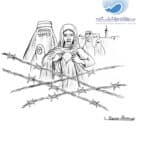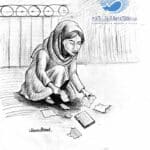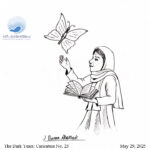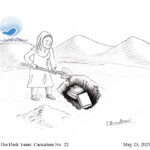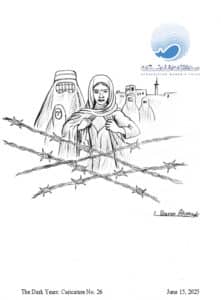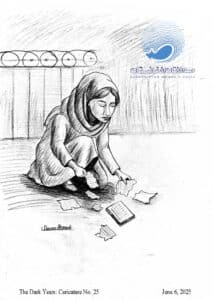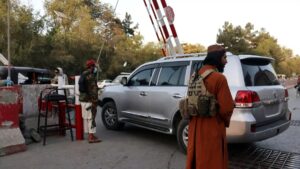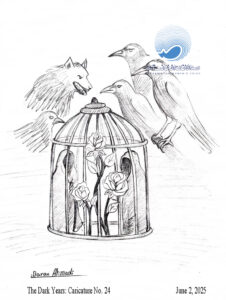Tales of the Dark Age (No. 58)
By Mumtaz Hosseini, Translated by Ahmad Ahmad Rezaei
Sabargul was born in a remote village in Uruzgan province of Afghanistan. Her father died just before she was born. The youngest of several siblings, she never knew him. Her mother, widowed young, was left to raise all the children alone.
Sabargul’s childhood was filled with hardship. While other children played, she worked. Her mother farmed a small patch of land and kept a few cows and sheep to feed the family. In good years, when rain fell, the harvest improved, and livestock could be sold. In dry years, there was barely enough to survive.
Sabargul never went to school; her mother couldn’t afford to send her. Her brothers, trapped in drug addiction, refused to work. As their addiction deepened, they sold everything: first the animals, then household goods, even their mothers and Sabargul’s clothes.
Her mother wept day and night, helpless to feed her children. In desperation, she began gathering wild grass to sell in the village. At just eight years old, Sabargul joined her under the scorching sun, collecting whatever they could to survive.
Years passed like this, barely getting by.
When one of her brothers got married, what little they had was spent on the wedding. Eventually, all the brothers left to start their own families, leaving Sabargul and her aging mother behind.
As her mother grew weaker, Sabargul was forced to take on even more responsibility. One day, her brothers sat with their mother and said, “You can’t keep going like this.”
Through tears, she asked, “Then what should I do?”
“Let Sabargul become a shepherd,” they replied. “Her wages can support you.”
Her mother protested. “How can a young girl herd animals alone? People will gossip.”
But her sons were unmoved. “Let them talk. She’s working. It’s no one’s business.”
With no other option, her mother reluctantly agreed.
Sabargul resisted at first. The thought of being alone in the mountains with animals scared her. But seeing her mother’s pain, she finally said, “Alright, Mother. I’ll do it.”
She made a deal with villagers to herd their animals for six months in exchange for 280 kilograms of wheat. Every morning before dawn, she led the animals to pasture. Every night she returned, exhausted, yet still helped with the housework and cared for her mother. The days were long, the work unforgiving.
In the final month of her contract, Sabargul was completely drained. One day, she fell asleep in the pasture from sheer exhaustion. When she awoke, some of the herd was missing. She searched frantically and found some animals near a group of Kuchis’ tents.
By then, it was already dark. The Kuchis told her, “You can’t go back now. Stay the night and leave in the morning.” Too tired to argue, Sabargul stayed.
Rumors began to swirl through the village that Sabargul had run off with the Kuchis. The whispers moved quickly from door to door, growing heavier with shame and suspicion. Her brothers didn’t ask questions. They didn’t wait to hear the truth. Their pride flared like dry grass set alight.
Early in the morning, they found her in the Kuchis village and dragged her to a nearby mountain. When they reached the top, Sabargul’s lips were cracked from thirst, and her body trembled with exhaustion. She could barely stand. Without a word of comfort, they told her to sit.
“Wait here,” they said. “We’ll bring you some water.”
Sabragul sat, tired and thirsty, looking out over the barren land, hoping they would return soon. However, they never returned with water.
Instead, they began to stone her.
The first stone struck her shoulder. Then others hit her head, back, and legs. Large jagged rocks, rough and sharp-edged, fell without pause. The attacks intensified, coming faster and harder. Sabargul’s body collapsed under a pile of rocks, blood pooling on the ground.
She lay there for a day and a night. No one came.
When the village mullah and a few elders pleaded with her brothers to allow her body to be washed and buried properly, they refused.
“She stays where she is,” they said.
Even death did not grant her peace.
Finally, mullahs and some villagers retrieved her body secretly. Without a proper washing or shroud, they buried her quietly on the same mountain, far from her home and family.
________________________________________
Author’s note:
This story was shared with Afghanistan Women’s Voice by someone who knew Sabargul’s life closely. At the storyteller’s request, we have used a pseudonym and changed identifying details to protect their safety and privacy. The story remains true in spirit and is shared with the hope that Sabargul’s suffering and the injustice she faced will not be forgotten.
The picture is captured from Internet
